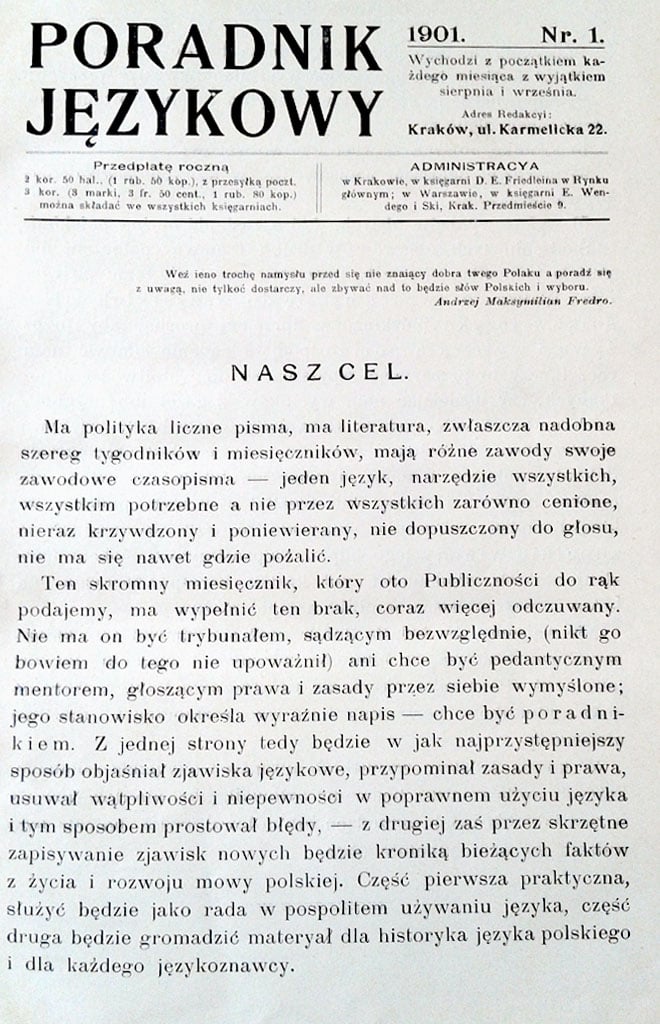III. Language standard and proper language use - the basic subject area of Poradnik Językowy

The concept of a language standard was conceived by the Prague School of Structuralism. It was defined, along with the concept of codification and functional varieties of the standard language, by Bohuslav Havránek, and then implemented into Polish linguistics by the already mentioned structural study of topics related to language culture prepared by D. Buttler, H. Kurkowska and H. Satkiewicz [1973]. Witold Doroszewski, deemed as the creator of language culture as a linguistic discipline, used the term language standard rarely, although he defined a language error as an unintentional and non-purposive deviation from the standard (literary) language or a language custom prevailing in a given community or in a given era in the development of the language. W. Doroszewski was the author of a paper entitled “Fizjologiczny mechanizm błędów językowych” (“A physiological mechanism of language errors”)*, which was crucial to this subject matter, and a great deal of advice and comments on proper language use, as well as explanations of words and expressions published in Poradnik Językowy. He also devised a model of activities for culture and language promotion, and the high esteem which he enjoyed as a linguist and an intellectual gave his judgments and guidelines a prescriptive character.
The standards in the contemporary Polish language have been discussed in Poradnik Językowy on a regular basis ever since this concept became rooted in Polish linguistics – cf. e.g. D. Buttler, “Typy błędów leksykalnych” (“Types of lexical errors”) (1970), “O sprawdzianach poprawności językowej w zakresie słownictwa” (“On testing proper language use with respect to lexis”) (1972), “Norma realna a kodyfikacja” (“The real standard versus codification”) (1986), “Niektóre cechy normy leksykalnej” (“Certain characteristics of the lexical standard”) (1990); S. Bąba, “Zagadnienia normatywnej łączliwości frazeologizmów” (“On prescriptive connectivity of idiomatic expressions”) (1986); B. Walczak, “O kryteriach poprawności językowej – polemicznie” (“Polemics on criteria for proper language use”) (1986); D. Bartol-Jarosińska, “Problematyka normatywna regionalizmów” (“Prescriptive aspects of regionalisms”) (1988); G. Dąbkowski, “O normie potocznej” (“On the colloquial standard”) (1989); J. Puzynina, “O pojęciu kultury języka” (“On the concept of language culture”) (1990), “Problem kodyfikacji normy języka polskiego” (“The problem of codifying the Polish language standard”) (1997); H. Satkiewicz, “O zasadach aktualnej polityki językowej” (“On the principles of the current language policy”) (1990); A. Pajdzińska, “Literatura a normy języka ogólnego” (“Literature versus standard language”) (1993); W. Lubaś, “Kilka uwag o kodyfikacji publicznej wymowy polskiej” (“A few comments on codifying the public Polish pronunciation”) (1995), “O polskiej polityce językowej” (“On the Polish language policy”) (2012); A. Grybosiowa, “O współczesnym stosunku do normy językowej. Uwagi dyskusyjne” (“On the contemporary approach to language standard. Comments for discussion”) (1999); J. Zimnowoda, “Normatywistyka wobec zapożyczeń w języku polskim” (“Prescriptivism as regards borrowings in Polish”) (1999); M. Bańko, “O normie i błędzie” (“On standard and error”) (2008), “Czego bronimy, broniąc języka? O możliwych przyczynach niechęci do wyrazów zapożyczonych” (“What do we safeguard when safeguarding the language? On possible reasons for aversion to borrowings”) (2014); U. Żydek-Bednarczuk, “Społeczeństwo informacyjne a problem normy językowej” (“The information society versus the problem of language standard”) (2007); E. Awramiuk, “Współczesna pisownia polska: między normą a uzusem” (“The contemporary Polish spelling: between the standard and the usage”) (2013); E. Gruszczyńska, “Norma językowa a przekład” (“Language standard and translation”) (2014); M. Bugajski, “Pragmatyka a lingwistyka normatywna” (“Pragmatics versus prescriptive linguistics”) (2013), “Kultura języka w Internecie” (“Language culture on the Internet”) (2015); M. Steciąg, “Kim jest językoznawca normatywista dziś? Przyczynek do dyskusji o zadaniach współczesnej normatywistyki” (“Who is a prescriptive linguist today? A contribution to the debate on objectives of the contemporary prescriptivism”) (2014); J. Porayski-Pomsta, “Językowa norma rozwojowa w ontogenezie wobec normy poprawnościowej języka polskiego” (“Language development standard in ontogenesis against the correctness standard of the Polish language”) (2015).
Undoubtedly, no other Polish or foreign journal has dealt with these topics so consistently and with changes in the language theory and linguistic concepts as well as positions presented by representatives of various academic circles taken into account. Moreover, one cannot forget about regular columns with linguistic guidance and comments introduced when Poradnik Językowy was headed by Roman Zawiliński, and further developed and improved with respect to their scientific value by Witold Doroszewski, and later edited by his successors and followers, including i.a. Mieczysław Szymczak, Andrzej Sieczkowski, Roxana Sinielnikoff, Danuta Buttler, Halina Satkiewicz, Janusz Siatkowski, Antonina Grybosiowa, Barbara Klebanowska, Zygmunt Saloni, Elżbieta Mańczak-Wohlfeld, Andrzej Markowski, Jan Miodek, Stanisław Bąba, Edward Breza, Jan Wawrzyńczyk, and most recently – Ewa Rudnicka, Dorota Połowniak-Wawrzonek, Beata Nowakowska, Marcin Zabawa, Katarzyna Kłosińska, Stanisław Dubisz. It needs to be emphasised once again: there is no other journal which would present these issues for such a long time and with such an intensity. It must be therefore stated that Poradnik Językowy has greatly contributed to the development of standard Polish and good practices in language communication.
